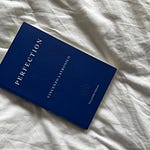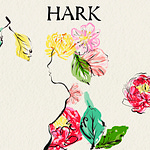Each episode of In Haste is accompanied below by an original essay by Alice Vincent or Charlotte Runcie. You can listen to the podcast here on Substack, on Apple, Spotify, or wherever you get your podcasts. Paid subscribers can access the first six episodes instantly right here on Substack. Upgrade your subscription by clicking the button.
On diaries
by Alice Vincent
It’s funny, the internet flotsam that sticks in your brain. I still remember seeing a photograph Amy Liptrot posted of her diaries. This was years ago now, and while the image is clear in my mind I have found differing versions of it in the strange archives we can scroll through online. I’ve held onto it, I think, because I was staggered by the sheer quantity of them: uneven stacks of lovely, beloved pages, thickened with words between notebook covers (I suspect Moleskine, but they could have been LEUCHTTURM1917s).
I remember the quantity and the longing because I was envious. I’m a person who has published memoirs, I write about my life twice a week on the internet, and slightly less often in newspaper and magazine columns, but I’ve never been a diary writer. I remember being given one as a child; a pink fluffy thing with one of those insubstantial little padlocks. I wrote down some big feelings in it and then felt so embarrassed by the whole affair that I never returned to it. The closest things I have are literal timekeeping diaries, with mentions of meetings and commitments and parties. These, strangely, I can’t bear parting with. I suppose it is in the granular that I can see the people I used to be.
When we had Amy on the podcast (her episode drops this week) she spoke about her diaries. She told us how she had kept them since childhood, how she still keeps them now - how the very writing of them, tucked up in bed, is a practice that reconnects her to her girlhood self; something pure and intimate and innately creative. And while, Amy explained, she would hate for them to be published as they currently exist, it’s her diaries that have bolstered her publishing career. Diary entries informed The Outrun and The Instant, her two hugely successful nature memoirs.
It’s one of those dreams that can exist for non-fiction authors: that you write a diary, and one day it ushers you into the realm of a prize-winning Sunday Times Bestseller. It worked for Amy, and so it could work for us, too, right?
But what if you’re just… not a diary-keeper? It’s a question I get asked relatively often, as a person who writes books based on her memories. I tend to reply that I can usually access what I need to, but sometimes refer back to emails or Facebook Messenger chats or even Instagram posts and photographs if I need a reference. I have had a couple of tries at journaling or the hallowed Morning Pages that so many writers swear by, but it’s just a habit I can’t stick to - no matter how disciplined I am. Days pass, then weeks. I feel the twinges of failure and guilt. What might I have documented better had I written it all down in the moment?
Funnily, hearing Amy speak about her diaries vanquished whatever lurking residue of envy I may have still harboured over them. There’s no world in which I would be able to write about my day at the end of it; I am a morning person who ideally likes to faceplant the pillow at 9pm after reading a few pages of a book. I never wrote diaries as a child, so there’s no little-me to connect to. I suppose I’ve come to trust in my process; that if it is big enough for me to need to write about, I will - whether that’s on my Notes app or several years later on a big desktop screen as part of a manuscript.
I’ve also come to see that my diaries exist in different forms. As newsletter posts (or, 15 years ago, blog posts, all of which I have no qualms about being buried on the internet) and Instagram captions, in my inbox and my columns and my books. It’s ephemeral, sure: no child of mine will stumble upon an emotional voicenote I sent after finishing a friend’s book, the wind bouncing off the Thames and dampening the microphone. But diaries aren’t meant to be read by anybody else - they exist for us. It’s what we make of them, as memory, as writing, as book, that matters.



















Share this post